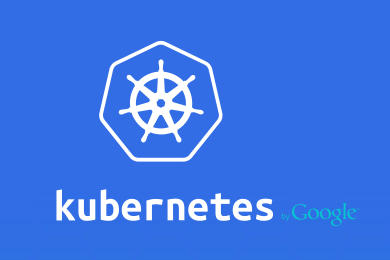 “Kubernetes is an open source orchestration system for Docker containers. It handles scheduling onto nodes in a compute cluster and actively manages workloads to ensure that their state matches the users declared intentions. Using the concepts of “labels” and “pods”, it groups the containers which make up an application into logical units for easy management and discovery.”
“Kubernetes is an open source orchestration system for Docker containers. It handles scheduling onto nodes in a compute cluster and actively manages workloads to ensure that their state matches the users declared intentions. Using the concepts of “labels” and “pods”, it groups the containers which make up an application into logical units for easy management and discovery.”
After our recent introduction of CoreOS support we are extending our containerization support by adding a Kubernetes toolset: commandline tools that work with our server management API to setup a Kubernetes master server and multiple minions. This toolset has been open sourced and is available for you to use in setting up and operating your Kubernetes clusters.
This is an initial release and we welcome your pull requests and feedback.
For the latest version of this document see https://github.com/pbkwee/rimuhosting-k8s
Using rimuhosting-k8s
Get a server API key at https://rimuhosting.com/cp/apikeys.jsp
If you do not already have a server with us, you will need to email RimuHosting and ask them to enable automated server setups on your account.
Git clone this project as well as https://github.com/pbkwee/RimuHostingAPI. The https://github.com/pbkwee/RimuHostingAPI project has a few changes required for rimuhosting-k8s and Python3.
Then on both run:
python3 setup.py build install
You should now be able to use the RimuHostingAPI Python library and rimuhostingk8s command line tools.
Create the master node:
$ python3 mkmaster.py --server_json sample-configs/unmodified/servers/server.json \
--cloud_config sample-configs/defaults/cloud-init/master.yaml \
--cluster cluster1
See that node:
$ python3 lscluster.py
{'cluster_masters': [{'cluster': 'cluster1',
'dc_location': 'DCDALLAS',
'domain_name': 'coreosmaster.localhost',
'memory_mb': 4096,
'order_oid': 916284575,
'primary_ip': 'xx.xx.xx.xx',
'running_state': 'RUNNING'}]}
Create a few minions:
j=0
for i in DCDALLAS DCAUCKLAND DCFRANKFURT; do
j=$((j+1));
python3 mkminion.py --server_json sample-configs/unmodified/servers/server.json \
--cloud_config sample-configs/defaults/cloud-init/node.yaml --cluster cluster1 \
--dc_location $i --domain_name coreos-minion-$j-$i.localhost &
done
See all those minions:
python3 lscluster.py --cluster cluster1
See export variables for this cluster:
$python3 env.py --cluster cluster1
export KUBERNETES_MASTER_IPV4=xx.xx.xx.xx
export SERVER_ARG='--server=http://xx.xx.xx.xx:8080'
alias rkubectl='kubectl $SERVER_ARG'
unset KUBERNETES_MINION_IPV4S
declare -a KUBERNETES_MINION_IPV4S
export KUBERNETES_MINION_IPV4S=( xx.xx.yy.yy xx.xx.yy.zz )
Set those variables in the current shell environment:
$ python3 env.py --cluster cluster1 > .config; source .config
Iterate over your minion VM ips:
$ for i in ${KUBERNETES_MINION_IPV4S[@]}; do echo $i; done
xx.xx.yy.yy
xx.xx.yy.zz
See your ’empty’ kubernetes cluster:
rkubectl get all
CONTROLLER CONTAINER(S) IMAGE(S) SELECTOR REPLICAS AGE
NAME CLUSTER_IP EXTERNAL_IP PORT(S) SELECTOR AGE
kubernetes 10.100.0.1 443/TCP 45m
NAME READY STATUS RESTARTS AGE
NAME LABELS STATUS VOLUME CAPACITY ACCESSMODES AGE
Load a simple test pod:
$ rkubectl create -f sample-configs/unmodified/busybox.yaml
pod "busybox" created
$ rkubectl get pods
NAME READY STATUS RESTARTS AGE
busybox 1/1 Running 0 37s
Run something in it:
$ rkubectl exec busybox -- echo 'Hello, world!'
Hello, world!
Setup the guestbook app:
# substitute the ip address for the environment value
$ rkubectl create -f <(cat sample-configs/defaults/skydns-controller.yaml | replace '$(KUBERNETES_MASTER_IPV4)' "${KUBERNETES_MASTER_IPV4}")
$ for i in \
sample-configs//defaults/skydns-service.yaml \
sample-configs//unmodified/guestbook/redis-master-controller.yaml \
sample-configs//unmodified/guestbook/redis-master-service.yaml \
sample-configs//unmodified/guestbook/redis-slave-controller.yaml \
sample-configs//unmodified/guestbook/redis-slave-service.yaml \
sample-configs//unmodified/guestbook/frontend-service.yaml \
sample-configs//unmodified/guestbook/frontend-controller.yaml; do
rkubectl create -f $i
done
See all of the new pods. Include –all-namespaces to include the kube-dns pods which are running in a kube-system namespace.
$ rkubectl get all --all-namespaces
NAMESPACE CONTROLLER CONTAINER(S) IMAGE(S) SELECTOR REPLICAS AGE
default frontend php-redis kubernetes/example-guestbook-php-redis:v2 name=frontend 3 21s
default nginx-controller nginx nginx app=nginx 2 26s
default redis-master master redis name=redis-master 1 17s
default redis-slave worker kubernetes/redis-slave:v2 name=redis-slave 2 14s
kube-system kube-dns-v9 etcd gcr.io/google_containers/etcd:2.0.9 k8s-app=kube-dns,version=v9 2 24s
kube2sky gcr.io/google_containers/kube2sky:1.11
skydns gcr.io/google_containers/skydns:2015-03-11-001
healthz gcr.io/google_containers/exechealthz:1.0
NAMESPACE NAME CLUSTER_IP EXTERNAL_IP PORT(S) SELECTOR AGE
default frontend 10.100.168.70 nodes 80/TCP name=frontend 19s
default kubernetes 10.100.0.1 443/TCP 51m
default redis-master 10.100.254.67 6379/TCP name=redis-master 16s
default redis-slave 10.100.53.177 nodes 6379/TCP name=redis-slave 13s
kube-system kube-dns 10.100.88.88 nodes 53/UDP,53/TCP k8s-app=kube-dns 23s
NAMESPACE NAME READY STATUS RESTARTS AGE
default busybox 1/1 Running 0 4m
default frontend-9les5 0/1 Pending 0 21s
default frontend-g1i7t 0/1 Pending 0 21s
default frontend-g6c9q 0/1 Pending 0 21s
default nginx-controller-5gqxy 0/1 Pending 0 26s
default nginx-controller-643wp 1/1 Running 0 26s
default redis-master-t4l3p 0/1 Pending 0 17s
default redis-slave-gewmp 0/1 Pending 0 14s
default redis-slave-qqlfa 0/1 Pending 0 14s
kube-system kube-dns-v9-9h2ub 0/4 Pending 0 24s
kube-system kube-dns-v9-icyqd 0/4 Pending 0 24s
NAMESPACE NAME LABELS STATUS VOLUME CAPACITY ACCESSMODES AGE
Figure out the external port for the frontend service:
$ rkubectl get svc frontend -o json | grep "nodePort"
"nodePort": 31108
See the IPs that the frontend service pods are running on:
$ rkubectl get pods -o wide | egrep 'NODE|frontend'
NAME READY STATUS RESTARTS AGE NODE
frontend-67zo9 1/1 Running 0 8m xx.xx.xx.yy
frontend-ch4o5 1/1 Running 0 8m xx.xx.xx.zz
frontend-xcgc8 1/1 Running 0 8m xx.xx.xx.zz
Then browse to that NODE:nodePort value. e.g. http://xx.xx.xx.yy:31108
Additional tips:
– add a –isreinstall to mkmaster to do a clean reinstall there.
– add a –reinstall_order_oid to mkminion to do a clean reinstall of a minion
– run rmcluster –cluster cluster1 to delete all the servers (master and minions) in a cluster
TODO:
– dns is currently broken somehow in the sample guestbook app above and is in needing of debugging.
– Need to add security to the master API (e.g. using secret tokens, or sharing around ca certs).
If you would like to work on the TODO list, please fork the project and contribute back. Email support at rimuhosting
before you start working on the TODO list to double-check it is current and we can pay a bounty for completing these tasks.
